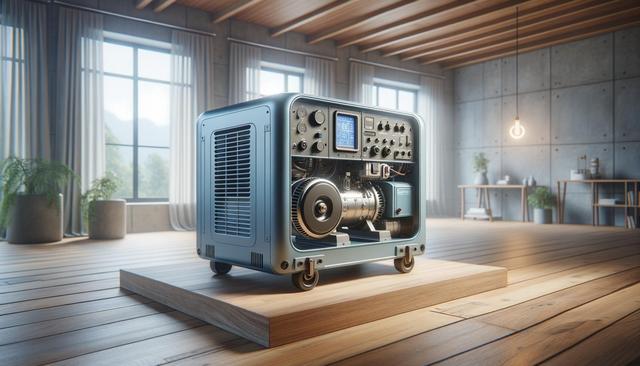The Role of Home Generators in Modern Living
As electricity continues to power nearly every aspect of daily life, the importance of uninterrupted access to energy has never been greater. Power outages, whether caused by extreme weather, grid failures, or maintenance issues, can disrupt routines and compromise comfort and safety. For this reason, installing a Generator For Residential Use has become a practical and forward-thinking decision for many homeowners. These systems provide automatic and immediate backup power, allowing households to continue operating essential appliances such as refrigerators, heating systems, and home medical devices.
Modern home generators are available in various sizes and capacities, making them suitable for everything from small apartments to large estates. Whether you’re looking for a compact unit to power basic lights and electronics or a more robust option that can handle the energy demands of an entire property, there are reliable solutions available to suit different needs.
Types of Home Generators to Consider
The market offers a range of generator types tailored to residential needs, each with its own strengths. One popular category is Whole House Generators Installed by professionals, which connect directly to a home’s electrical system. These standby systems automatically detect outages and switch on, offering seamless power continuity. For homeowners seeking greener energy alternatives, Backup Solar Powered Generators are gaining attention. These systems harness solar energy and store it for use during emergencies, reducing dependence on fossil fuels.
Some of the main types of generators for home use include:
- Portable Generators: Easy to move and ideal for short-term power needs
- Standby Generators: Permanently installed and designed for long-term outages
- Inverter Generators: Known for clean energy output, suitable for sensitive electronics
- Solar Generators: Environmentally friendly and quiet, but dependent on sufficient sunlight
Choosing the right generator often depends on your power requirements, budget, and installation preferences.
Installation and Maintenance Essentials
Proper installation and regular maintenance are critical to ensure the longevity and efficiency of any home generator. For larger systems like Whole House Generators Installed by certified technicians, professional installation ensures compliance with local codes and safe integration with the home’s electrical panel. These systems often require fuel sources such as natural gas or propane, and the installation process includes preparing a stable base, connecting fuel lines, and integrating smart monitoring systems.
Maintenance routines vary by generator type but generally include:
- Checking fuel levels and quality
- Testing the battery and electrical connections
- Changing oil and filters as recommended
- Running periodic load tests
Many homeowners opt for service agreements that include scheduled inspections and emergency support, giving peace of mind that the system will perform when needed. This is especially important for larger units such as a Caterpillar Generator, which are built for durability and consistent performance.
Balancing Power Needs and Energy Efficiency
When selecting a Generator For Residential Use, it’s vital to assess your household’s energy consumption and determine which appliances and systems you want to keep running during an outage. Calculating total wattage requirements helps in choosing a generator with appropriate capacity. Oversizing a generator can lead to unnecessary fuel usage, while under-sizing may result in system overloads and reduced lifespan of the unit.
Some homeowners choose to power only essential systems, which can include:
- Refrigerators and freezers
- Heating and cooling systems
- Lighting circuits
- Medical equipment
- Communications and security systems
Energy-efficient appliances and LED lighting can help reduce the total load, allowing for more effective use of backup power. For those interested in minimizing their environmental impact, Backup Solar Powered Generators offer a cleaner solution while contributing to long-term sustainability.
Choosing Reliable Generator Brands and Models
Reliability and durability are key considerations when investing in a home generator. Established manufacturers offer a wide range of products, including options like Caterpillar Commercial Generators, which are known for their rugged build and consistent performance. These units are often adapted for residential use, especially in larger homes requiring high-capacity backup systems.
When evaluating potential generators, factors to keep in mind include:
- Noise level and location of installation
- Fuel type and availability
- Smart features such as automatic start and remote monitoring
- Warranty and customer support availability
- Compatibility with existing home systems
Working with a qualified installer can help you assess your needs and choose a generator that fits your budget and energy goals. Whether you opt for a traditional unit or consider a hybrid system combining solar and fuel-based technology, a dependable generator setup can offer long-term value and peace of mind.
Conclusion: Empowering Your Home with Smart Energy Choices
Investing in a generator is a strategic step toward enhancing your home’s energy resilience and independence. With options ranging from compact residential models to powerful Caterpillar Generator systems, there’s a solution for nearly every household. Whether you’re interested in traditional fuel-based units or exploring the benefits of Backup Solar Powered Generators, understanding your power needs and exploring professional options like Whole House Generators Installed can lead to better energy preparedness. As energy demands continue to grow and grid reliability fluctuates, having a Generator For Residential Use ensures that your home remains functional, safe, and comfortable—no matter what challenges arise.




Leave a Reply